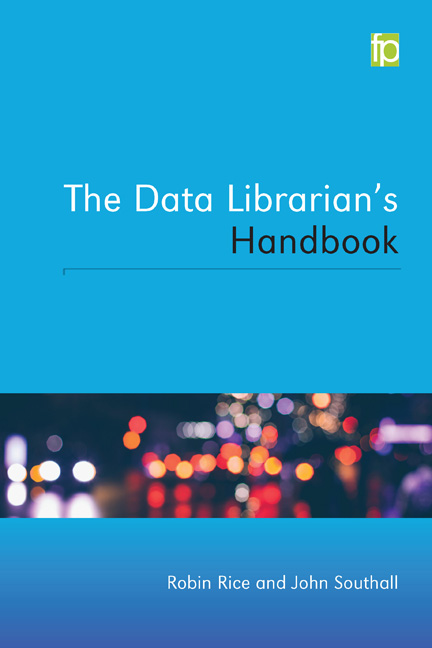Book contents
- Frontmatter
- Contents
- Acknowledgements
- Preface
- 1 Data librarianship: responding to research innovation
- 2 What is different about data?
- 3 Supporting data literacy
- 4 Building a data collection
- 5 Research data management service and policy: working across your institution
- 6 Data management plans as a calling card
- 7 Essentials of data repositories
- 8 Dealing with sensitive data
- 9 Data sharing in the disciplines
- 10 Supporting open scholarship and open science
- References
- Index
2 - What is different about data?
Published online by Cambridge University Press: 08 June 2018
- Frontmatter
- Contents
- Acknowledgements
- Preface
- 1 Data librarianship: responding to research innovation
- 2 What is different about data?
- 3 Supporting data literacy
- 4 Building a data collection
- 5 Research data management service and policy: working across your institution
- 6 Data management plans as a calling card
- 7 Essentials of data repositories
- 8 Dealing with sensitive data
- 9 Data sharing in the disciplines
- 10 Supporting open scholarship and open science
- References
- Index
Summary
Attitudes and pre-conceptions
The daily work of the data librarian can be quite similar to that of our more traditional named academic librarians. It can involve working within library systems, acquiring resources and developing working relationships that allow you to promote the role of your library. The fact we work with research data alongside periodicals, books and other publications should not make that much of a difference to how our work is seen but for a variety of reasons it does. The word ‘data’ itself is off-putting to some traditional academic librarians and researchers and a cause of some anxiety. For some it is because it seems to belong to other disciplines and have little relationship with their own work. Others see it as being such a common word as to be almost indistinguishable from ‘information’.
A good example of these different perspectives can be seen in the social sciences. Researchers that use survey techniques and questionnaires create a body of data that can be recorded, analysed, summarized in the form of statistics and, in due course, form the basis of publications. They are clear that this is their dataset and appreciate its role in enabling analysis. It is numerical, quantitative and quite obviously ‘data’. On the other hand researchers using qualitative techniques such as semi-structured interviews or focus groups create a body of work that includes audio transcriptions as well as perhaps audio recordings or photographs. This material is just as crucial in informing analysis but within that tradition it is routinely not perceived or referred to as ‘data’. A similar situation can be seen in many disciplines within the humanities (Ward et al., 2011), which focus on working with ‘primary materials’. Within visual art research a similar resistance has been noted so that there is, ‘An additional task to those working towards the same ends in other disciplines: the translation of scientific RDM concepts into language meaningful to those working in creative arts disciplines’ (Guy, Donnelly and Molloy, 2013, 101).
Data librarians need to be aware of these nuances if they are to be successful in promoting RDM. Reflection on the attitudes you encounter and adopting the terminology of different user communities will be important in offering effective support from your library during a research project.
- Type
- Chapter
- Information
- The Data Librarian's Handbook , pp. 19 - 34Publisher: FacetPrint publication year: 2016



